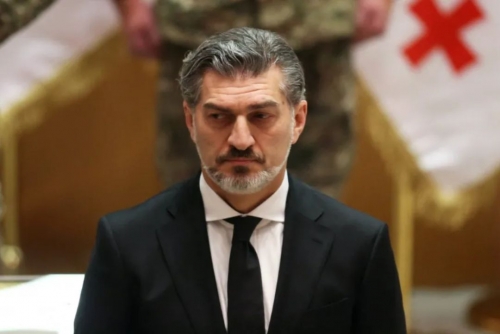Thousands Protest Inauguration of New Georgian President Amid Political Turmoil
TDT | Georgia
Email: mail@newsofbahrain.com
Thousands of Georgians took to the streets of the capital, Tbilisi, on Sunday, protesting the inauguration of Mikheil Kavelashvili, a former professional footballer and a close ally of the ruling Georgian Dream party. Kavelashvili’s swearing-in marks a significant moment in the country's political history as he assumes the presidency during a period of growing unrest.
The protests come at a time of heightened tensions following the Georgian government's suspension of its bid to join the European Union. The move, along with allegations of fraud in the October parliamentary elections, has sparked a wave of street demonstrations, with many citizens voicing their discontent over the direction the country is taking.
Outgoing President Salome Zourabichvili, who has been a vocal critic of Georgian Dream, refused to step down on Sunday. In an address to the crowd gathered outside the presidential palace, she declared that she remained the "only legitimate president" of Georgia, despite the inauguration of her successor. Zourabichvili further labeled Kavelashvili’s presidency as illegitimate, telling protesters, “This building was a symbol only as long as a legitimate president was sitting here.”
Zourabichvili’s stance reflects the deepening political rift between the Georgian Dream party, which has become increasingly authoritarian in recent years, and opposition groups. Four major opposition parties have rejected Kavelashvili’s election and have boycotted parliament. The former MP for Georgian Dream was the sole candidate in the presidential race, and Zourabichvili had previously described his election as a “travesty.”
The political unrest is exacerbated by Georgia’s growing disillusionment with the Georgian Dream leadership. Under the party's rule, the government has passed controversial laws targeting independent media and non-governmental organizations receiving foreign funding. These laws, coupled with actions against the LGBT community, have sparked widespread condemnation from domestic and international critics.
The ruling party’s refusal to join Western sanctions on Russia after the invasion of Ukraine and its dismissal of Western governments as part of a “global war party” has further alienated many Georgians who had hoped for closer ties with Europe. Despite this, an overwhelming majority of Georgians continue to support the country's path to EU membership, which is enshrined in the constitution.
In November, however, Georgian Dream announced that it would delay pursuing EU accession talks until 2028, a decision that ignited protests across the country. Riot police were deployed, using tear gas and water cannons against demonstrators, who retaliated with fireworks and stones.
On the eve of Kavelashvili's inauguration, protesters once again took to the streets, waving Georgian and EU flags. A human chain spanning several kilometers was formed in a symbolic gesture of defiance. One protester shared with the Associated Press, “I am out in the street together with my whole family trying somehow to tear out this small country out of the claws of the Russian empire.”
The United States recently imposed sanctions on Bidzina Ivanishvili, the former prime minister and billionaire founder of the Georgian Dream party, further fueling tensions.
Georgia’s political system is a parliamentary democracy, with the president serving as the head of state and the prime minister acting as the head of parliament. Zourabichvili, who took office in 2018 with the backing of Georgian Dream, has since condemned the party’s contested election victory in October as a “Russian special operation.” She has also supported pro-EU protests outside the parliament, calling for Georgia to align itself with the West.
As the country braces for further unrest, it remains to be seen how Kavelashvili’s presidency will shape the future of Georgia’s political landscape and its relationship with both the European Union and Russia.
Related Posts

